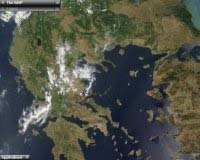| . |  |
. |
La Paz, Bolivia (UPI) Jun 15, 2010 Bolivia's plans to exploit its iron ore reserves in a test run for similar deals on lithium, uranium and other minerals are stalled because of a complex dispute with Indian investors and steelmakers. President Evo Morales wrote tough protective provisions into Bolivia's new constitution to ensure foreign entrepreneurs vying for the country's mineral wealth don't acquire unfair advantage over underdeveloped resources. Viewed against Bolivia's historical experience with foreigners, the constitutional safeguards seem an understandable response. But India's difficulties with the Mutun iron project indicate that all may not be well with Bolivia's plan to attract only the "right kind" of foreign investors. Most Western investors have been ruled out of the equation by prohibitive provisions. That leaves the door open -- in theory at least -- for investors from emerging economies such as India and China. In practice, Indian business representatives complained they were becoming drawn into internal politics and possibly malpractices. Jindal Steel and Power, a leading steel manufacturer, said it was told a contract it signed with the Bolivian side in 2007 could require revision because of new legislation designed to draw more investment into the country. Bolivian Mines Minister Jose Pimentel told the media an addendum might be required to the Bolivian contract with Jindal for the exploitation of the Mutun iron ore reserves. Relations between Bolivia and the Indian corporation soured when the Bolivian government decided to cash a $18 million guarantee deposit for the steel project in the eastern state of Santa Cruz, which has one of the world's largest unexploited iron ore deposits. Bolivia said it was right in doing so because Jindal had fallen behind with promised investment. The Bolivian Mines Ministry accused Jindal of having invested only $12 million of a promised $600 million. Jindal responded that the government hadn't honored its commitment to provide land for the project to begin. Bolivian officials said only a small part of the land had yet to be allocated. Officials said Bolivia had pinned hopes on the project coming on stream, putting the country on course to becoming a major steel producer by 2014. Officials said talks with China and South Korea were under way to cut additional deals with those two countries for exploitation of the iron ore mines. It wasn't immediately clear if Bolivia would keep the contract with Jindal or seek substitute investors if the dispute was not resolved. Jindal representatives said the contract was being blocked from within the Bolivian government by people who didn't want the project to go ahead. Meanwhile, interest in other mineral deposits in Bolivia has drawn investors. An estimated 50 percent of the world's known lithium reserves lie in remote parts of Bolivia's Andean high-mountain plateau, where some of the world's largest uranium deposits have also been located. Lithium, a low-density metal used in batteries, is seen as crucial to the auto industry's effort to produce hybrid and electric cars. Currently, competing research programs at automotive companies in Europe, Japan and the United States are busy developing energy-efficient, battery-operated cars as substitutes for gasoline-fired cars. A growing global consensus on nuclear power has also ignited interest in uranium deposits worldwide.
Share This Article With Planet Earth
Related Links Global Trade News
 China boosts investments in debt-hit Greece
China boosts investments in debt-hit GreeceAthens (AFP) June 15, 2010 China pledged to encourage investment in debt-stricken Greece as the Asian economic powerhouse Tuesday signed a maritime accord with Athens and Chinese businesses sealed 13 deals with Greek companies. "The government is going to encourage Chinese entrepreneurs to come to Greece to make partnerships and investments," said Deputy Prime Minister Zhang Dejiang during a signing ceremony in the Gr ... read more |
|
| The content herein, unless otherwise known to be public domain, are Copyright 1995-2010 - SpaceDaily. AFP and UPI Wire Stories are copyright Agence France-Presse and United Press International. ESA Portal Reports are copyright European Space Agency. All NASA sourced material is public domain. Additional copyrights may apply in whole or part to other bona fide parties. Advertising does not imply endorsement,agreement or approval of any opinions, statements or information provided by SpaceDaily on any Web page published or hosted by SpaceDaily. Privacy Statement |